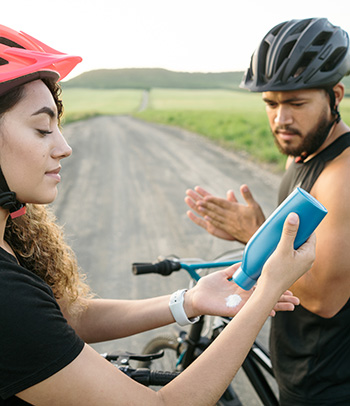Summer is here, and for many of us, that means spending more time outside in the sun. Whether you are spending time at the beach, hanging out in the yard or working in the sun, it’s important to protect your skin and your eyes from harmful UV exposure.
Understanding the risks of too much sun and taking the proper precautions means you can still enjoy the warm weather and all your favorite summer activities.
Risks of UV Exposure
Enjoying the summer sun doesn’t have to be risky. You can still do the outdoor activities you love with the right protection for your skin and eyes.
The sun emits radiation known as UV-A and UV-B rays. Both types can damage your eyes and skin. UV-B rays have short wavelengths that reach the outer layer of your skin, and UV-A rays have longer wavelengths that can penetrate the middle layer of your skin. If you don’t protect yourself properly from the sun’s UV rays, you can expose yourself to several health risks, including:
- Vision problems such as cataracts and long-term damage to your eyes
- Suppression of your immune system
- Your skin normally mounts a defense against foreign invaders such as cancers and infections, but too much UV radiation can weaken your body’s natural defenses.
- Premature aging of your skin including wrinkles, sunspots, etc.
- Sunburn
- Even a single sunburn can increase your risk for skin cancer.
- Skin cancer – both melanoma and nonmelanoma
- This is the most common type of cancer in the United States and can be serious and life-threatening.
- Unprotected exposure to UV radiation is the most preventable risk factor for skin cancer.
People of all ages and backgrounds are at risk for sun damage, but some people have an even higher risk. This includes people:
- With freckles or very fair skin
- Who are exposed to sunlight that is reflected off water or snow
- Who live near the equator or at high altitudes
- Who take medications that can make your skin easier to burn, such as certain birth control pills or antibiotics, or even cosmetics
How to Protect Yourself From Too Much UV Exposure
 Enjoying the summer sun doesn’t have to be risky. You can still do the outdoor activities you love with the right protection for your skin and eyes. Here are some easy ways to keep yourself safe:
Enjoying the summer sun doesn’t have to be risky. You can still do the outdoor activities you love with the right protection for your skin and eyes. Here are some easy ways to keep yourself safe:
- Cover up. Think about all the skin that you’re exposing to the sun, from your head to your toes, and cover up what you can. A wide-brimmed hat can protect your head and neck, and your clothes can keep your body protected as well. If you’re heading to the beach, look for swimsuits and cover-ups that block UV rays.
- Choose good sunglasses. They don’t have to be expensive but consider glasses that cover a large area around your eyes and that advertise protection from UV exposure.
- Stay in the shade. When you can, seek out ways to avoid direct sunlight, especially between the hours of 10 a.m. to 4 p.m. when the sun is the strongest. Consider exercising in the early morning or gardening in the evening.
- Do not use tanning beds or sunbathe. You can find ways to get a tan nowadays that don’t involve UV radiation, such as spray tans or lotions.
- Use lip protection. Many lip balms offer UV protection and contain SPF.
- Check your skin once a month for unusual new moles or changes to existing ones. If you notice anything unusual, contact your health care provider.
- Protect yourself in different types of weather. Clouds only block 20% of the sun’s harmful rays, so you can still damage your skin and your eyes on cloudy days.
- Choose the right sunscreen.
- According to the FDA, your sunscreen should be SPF 15 or higher and protect you against UV-A and UV-B rays.
- You should reapply it every two hours or more often if you are swimming or sweating.
- You should put it on 15-30 minutes before you go out in the sun.
- Do not use sunscreen if it’s expired.
Resources
The UV index can give you an idea of how strong the UV light is in your area on any given day, on a scale of 1 to 11+. A higher number means a greater risk of exposure to UV rays and a higher chance of sunburn and skin damage. The United States Environmental Protection Agency provides an easy way for you to check the UV index in your area. Type in your zip code and get that day’s UV forecast from low to extreme. You can also download a free app on your phone to access this information whenever you need it.
The Department of Veterans Affairs offers a lot of information related to UV exposure. Their Quality of Care page provides good tips for your time in the sun, including links to articles such as:
Have fun in the sun this summer, but remember to arm yourself with the right knowledge and tools to stay protected.







